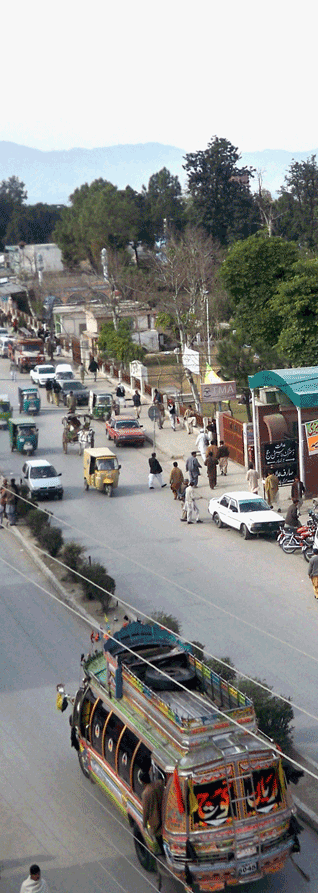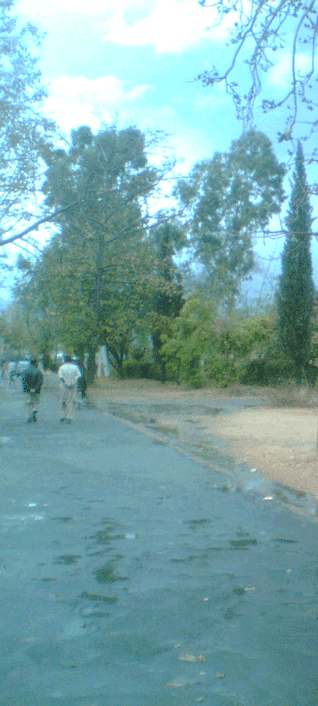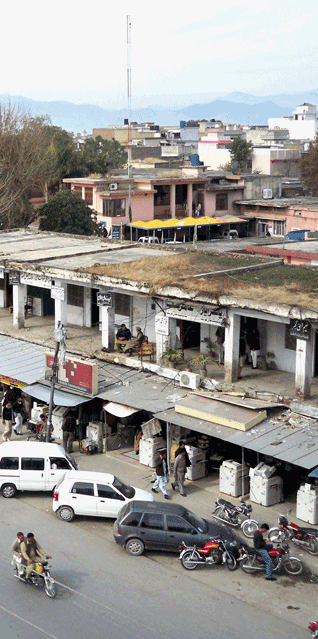Partition
The Incident in The Gurdwara:
Tales of Haripur, Part II
by Dr. Bhai HARBANS LAL
Part Two ...
Haripur, NWFP ... now in Pakistan
I regularly attended the Gurdwara Guru Nanak Satsang Sabha in Haripur.
The daily program at this gurdwara began before dawn at 4 am and would end with sunrise so that everyone could go to their work and children would not be late to school.
I recall an unfortunate event one day which put the whole town on edge. Though deeply troublesome, it was a learning experience for me as well as the community, inculcating the importance of unity in the town amongst its inhabitants, regardless of their religion or social backgrounds.
It all started with the gurdwara caretaker informing the congregation about a grave sacrilege he had witnessed that day. The caretaker was a volunteer sehajdhari Sikh who would go to the gurdwara every day at 3 am.
Sehajdhari (“on the slow-and-steady path“) Sikhs are those who are not baptized and as such did not wear all the Sikh articles of faith. Nevertheless, they observed some of the maryada and were very much a part of the Sikh community in worship and faith practices.
This sehajdhari volunteer opened the door to the sanctuary hall for cleaning and other preparations as usual.
On that particular day, he was shocked to see that someone had slipped in a cigarette-butt under the door.
The nature of the discovery indicated that it had to be as a result of a deliberate act, since it was known across the length and breadth of the sub-continent that tobacco, and therefore cigarettes, are an absolute taboo to Sikhs.
And to understand the seriousness of the incident, it is necessary to remember that those were relatively straight-forward times, when religious codes of conduct were taken seriously by all faiths around the world. Certainly in my youth and until a few decades ago, for example, I cannot remember ever having heard of - leave alone, seen! - a Sikh even touching, literally touching, a cigarette or any tobacco product.
The sevadaar promptly cleaned up the place and reported the matter forthwith to the management as soon as the daily congregation began. There was pin drop silence as, gauging the possible implications, everyone seemed to be in shock. This was, in those simpler and uncomplicated times, an outright blasphemous act that no one expected in this peaceful town.
At the end of the service a delegation of Sikh elders went straight to the city administration to file a complaint. On hearing their complaint, the city officials - including the police chief - immediately stood up from their chairs with folded hands. They expressed their profound shock and declared a curfew in the entire city. Furthermore, they issued an administrative order urging the population to close their businesses and join with their Sikh brethren to pray to God for repentance and forgiveness.
Mind you, the city administration was totally Muslim, except for my father who was a member of the City Council - later to be appointed the Mayor.
A large tent was erected in the school playground for Akhand Paatth, a continuous reading of the Guru Granth, which normally takes 48 hours. This was how the community was programmed, to seek spiritual inspiration in times that required reflection and action, and how solidarity and support was demonstrated by the administration and the residents alike with the Sikh faithful, to assuage their concerns.
At the conclusion, a prayer meeting was held where civic leaders and city officials spoke to express their anguish over the unfortunate incident in their otherwise peaceful town. The people - Hindu, Muslim and Sikh - embraced each other as a token of peace and love, a custom common to both Pathan and Sikh cultures.
Then, in accordance with Sikh tradition, the attendees - almost the entire population of the town - was served guru-ka-langar.
Amazingly, the Muslim community leaders took the incident with the same spirit as us - as if the blasphemy had been committed with regard to the holy Quran or in the mosque. They were genuinely grieved to find that such an incident had taken place in the presence of the Sikh Scripture.
This was a commendable show of reverence for Sikhs and their religion by the Muslim community. It is trite to say that the Sikhs would have reciprocated with the same spirit, if the Muslims had been subjected to a similar sacrilege.
Thus, there was an immensely cordial relationship between Muslims and the non-Muslims in the town. Both the communities - Sikhs and Muslims - would interact every day in markets, bazaars, schools, public places and at cultural fairs. They would also visit each other’s houses as a gesture of friendship and goodwill, to see a patient, or greet a guest or simply to chat.
Both went for early morning walks in the same nearby fields and woods. There was a small rivulet known as a ‘soaka’ - meaning, a stream which would remain dry, except during the rain spells. It provided a charming walking path. People freely exchanged each other’s salutations: ’Assalam - Alaikum‘ or ‘Sat Sri Akaal’. Sikhs would be reciting their nitnem in silence, while the Muslims would be doing the same with their liturgy from the Holy Quran.
During my recent visit to Pakistan, I traveled to Haripur. My hosts - Pakistani Muslims - took me to the banks of the historic River Indus. I was astonished to observe that many of the traditions and practices I had witnessed there more than half-a-century ago were still intact.
Like in the past, the locals were walking on the banks of river, engaged in their morning routine; some strolling and others sitting in a quiet corner … even though it was in the middle of a freezing winter when I was there.
The only difference was that I was now the only Sikh around!
Continuing tomorrow ... Part III
August 10, 2011
Conversation about this article
1: Gurinder singh (Stockton, California, U.S.A.), August 10, 2011, 4:48 PM.
Bhai Harbans Lal ji, is Haripur the same as Haripur Hazara?
2: Sangat Singh (Kuala Lumpur, Malaysia), August 10, 2011, 6:52 PM.
Bhai Sahib: Also, is Haripur Khas same as the Haripur you are from?
3: Sangat Singh (Kuala Lumpur, Malaysia), August 10, 2011, 7:08 PM.
In pre-partition days I remember in Lyallpur Sikhs used to set up stalls to serve 'kucchi lassi' during Muharram, when 'Tazia' was celebrated. The prominent location used to be the Railway Bazaar next to the 'Wadda Gurdwara'. This is an image from my childhood picture still etched on my mind's canvas. When will we learn how to live peacefully again?
4: A.S. ( New York, U.S.A.), August 10, 2011, 8:35 PM.
This is in reply to Gurinder Singh ji, that Haripur is a city located in Pakistan in the Haripur District of Hazara Division of Hazara.






